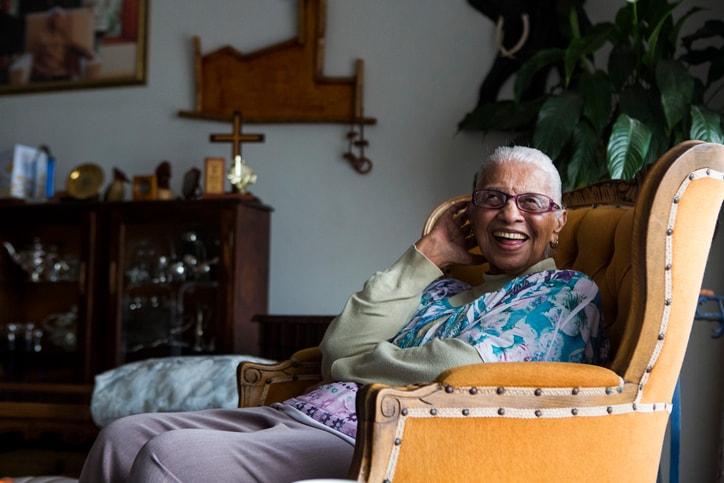In this article
Just as every senior’s needs are unique, so too are their care options. This can make finding the right fit feel overwhelming, especially for seniors and caregivers seeking financial assistance — because long-term care coverage is not just income or age-based, but also needs-based.
To determine who is eligible for federal and state long-term care coverage, care providers rely on what’s called a nursing facility level of care (NFLOC) assessment, which is a way to measure how much help a person requires daily, explains Moti Gamburd, chief executive officer of CARE Homecare, an in-home senior care provider in Los Angeles. “The purpose of this process is not to complicate things for families but to ensure that support gets to those who truly require it,” Gamburd says. What’s more, educating yourself on NFLOC can open the door for programs that can help caregivers with costs, whether for a nursing home or care at home, he says.
So what goes into an NFLOC assessment? And how is qualifying for nursing home level of care related to Medicaid eligibility? Here, experts explain everything caregivers need to know.
What is nursing facility level of care (NFLOC)?
Nursing facility level of care — care that aligns with the type of 24-hour medical services provided by nursing homes — is a numerical score generated by an assessment designed to evaluate a senior’s needs, explains Diana Choy-Shan, an elder law attorney specializing in Medicaid benefits at Cona Elder Law. “This assessment tool considers applicants’ medical needs and functional limitations and utilizes the data collected to identify appropriate services and programs,” she says.
In simple terms, an NFLOC assessment is a checklist that measures a person’s ability to do daily activities like bathing, eating and taking medications, among other health needs, Gamburd explains. “For instance, someone who has trouble standing up without help or who forgets to take medicine may meet the NFLOC criteria because they need help on a regular basis.”
Why NFLOC is important for Medicaid eligibility
Medicaid, America’s public health insurance program for people with low income, utilizes NFLOC to determine long-term care coverage eligibility. State Medicaid programs must provide nursing home services for adults in need, according to the Centers for Medicare & Medicaid Services. You need to meet the state’s NFLOC criteria for them to designate you as “in need” and therefore eligible for Medicaid-funded nursing facility services.
“However, most people do not realize that NFLOC is not restricted to nursing homes,” Gamburd says. “Medicaid’s Home and Community-Based Services (HCBS) waivers provide options for individuals meeting the NFLOC criteria to remain in their home and still receive assistance.”
NFLOC and Medicaid HCBS Waivers
HCBS waivers provide long-term care services through Medicaid outside of an institutionalized setting, i.e. nursing homes, Choy-Shan explains. Waivers are designed at the state level, and eligibility is based on certain cost criteria and NFLOC qualification, she says.
If an applicant meets NFLOC criteria for HCBS waivers, they could be eligible for long-term care support, including live-in caregivers, meal delivery or adult day care programs, according to Gamburd. “For example, I worked with a family who had a loved one who, due to mobility issues, qualified for an HCBS waiver,” he says. “They were able to employ in-home care and physical therapy to support the senior.”
How is NFLOC criteria determined?
NFLOC is determined on a state‐specific basis, with each state establishing criteria applicants must meet to receive long-term care coverage through Medicaid. “Though there are some minimum expectations set by the federal Center for Medicare & Medicaid Services, individual states interpret and carry out their own Medicaid rules,” explains Sarah Milanowski, manager of enrollment and marketing at LifeCircles PACE in Muskegon, Michigan. “Each state’s Medicaid program has its own standards of how to determine if someone is eligible for nursing facility level of care.”
For example, in Michigan, the process is outlined in the Michigan Medicaid Nursing Facility Level of Care Determination (LOCD) form. “If the individual is determined to not be eligible through LOCD, the long-term care program will not be able to enroll them,” Milanowski says. If someone is found eligible for NFLOC, they can apply for coverage through the Michigan Medicaid Program, which has its own financial guidelines, she explains. You must meet both state Medicaid requirements as well as NFLOC assessment criteria to receive funding.
There is no cost for applicants to be assessed for NFLOC, Milanowski notes. “However some programs require an initial telephone screen to determine if someone is eligible for a face-to-face assessment,” she says.
What happens during an NFLOC assessment?
Licensed healthcare professionals conduct NFLOC assessments — think nurses, social workers or physician assistants, Milanowski says. Assessors must also have completed Uniform Assessment System (UAS) training, a program that teaches people how to evaluate individuals in need of home care or long-term care, Choy-Shan adds.
“To conduct the assessment, a qualified licensed health professional meets face to face with the individual, and if possible, with someone close to the individual who is aware of the individual’s recent physical, cognitive, health and behavioral challenges,” Milanowski says. Using their state’s assessment tool, a thorough evaluation is then completed to determine how key factors impact the individual’s daily functioning, Milanowski explains.
NFLOC assessment areas of focus
While the sections in an NFLOC assessment differ by state, these are the most consistent areas of focus used to determine nursing home level of care, according to the experts:
- Functional status evaluates an applicant’s ability to complete activities of daily living, including dressing, bathing and feeding.
- Cognitive health is assessed through questions relating to memory, decision-making and how well the person understands basic safety, Gamburd says.
- Medical treatments and conditions, including unstable conditions requiring frequent physician visits or order changes, as well as rehabilitative therapies.
- Mood and behavior, including behavioral challenges, concerning hallucinations or delusions that could impact care.
- Service dependency, or how long an individual needs NFLOC, is typically required to be at least one consecutive year for coverage eligibility, Milanowski says.
One NFLOC focus area that often gets overlooked is cognitive health, Gamburd notes. “For example, a person might exercise regularly but forget how to use the stove or leave doors unlocked, which can create serious safety problems,” he says. “This can be just as important as physical limitations when deciding if someone is eligible.”
How an NFLOC assessment is scored
“Within each section of the assessment, the assessor is trained to specify the degree of assistance needed,” Choy-Shan says. This is how they rate degrees of assistance:
- Independent.
- Setup help.
- Supervision.
- Limited assistance.
- Extensive assistance.
- Maximal assistance.
- Total dependence.
Each degree of assistance is then linked with a numerical score, and each section has a minimum number of points an applicant must earn to qualify for NFLOC, Choy-Shan explains. “In theory, the greater the Medicaid applicant’s needs, the higher the NFLOC score,” she says.
Can you prepare for an NFLOC assessment?
Yes, there are ways both caregivers and applicants can prepare for an NFLOC assessment, according to our experts. Prior to the assessment, Milanowski urges caregivers to keep detailed notes documenting medical conditions and changing or challenging behaviors, and to meet with their doctors to get professional physical and mental health assessments.
“Oftentimes NFLOC assessors will be asking very precise questions about the frequency of help needed,” she says. “Try not to only answer their question, but offer relevant examples from the last few months.”
As for NFLOC applicants, Choy-Shan reminds her clients that an ideal NFLOC assessment is performance-based and not only based on personal testimony. Therefore, she recommends the Medicaid applicant be prepared to do the following:
- Attempt to perform a series of activities of daily living, as well as other physical tests (walking, transferring in and out of a bed, climbing stairs, etc.).
- Accurately report and recite diagnoses.
- Report dates and incidents for recent hospitalizations.
- Prepare a list of current medications.
The bottom line
Nursing facility level of care (NFLOC) refers to the type of 24-hour medical assistance provided in a nursing home. States require seniors to take an NFLOC assessment that examines key areas like physical capabilities, cognitive abilities and behavioral health to determine if their needs are great enough to be eligible for long-term care coverage through Medicaid.
Since NFLOC criteria are different in every state, the best way to make the process go smoothly is to research and find out exactly what you need for NFLOC in your area, Milanowski says. “Depending on what state you are in, your state’s health department should have more information on their website about the process,” she says. You can learn more about Medicaid eligibility for long-term care on Medicaid.gov.





